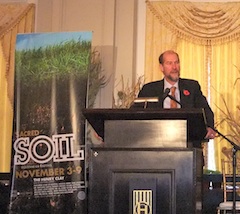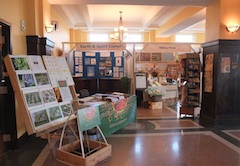| |
|
 |
Sacred Soil: the foundation of life
November 10, 2020:
 |
 |
 |
Martin Palmer at the Sacred Soil festival |
We rarely think about the soil beneath our feet; we certainly don't consider that one inch of 'dirt' contains billions of living organisms or that healthy soil is literally the foundation of life.
 |
 |
 |
One of 60 stands and exhibits at Sacred Soil |
That sacred connection between soil, life, faith and our relationship with all creation was the theme of this year’s 15th annual Festival of Faiths at Louisville, Kentucky, in the United States.
Soil has been described as “the ecstatic skin of the Earth” by writer William Hogan, author of Dirt!, which was celebrated at the Sacred Soil Festival of Faiths, along with the film based on his book, entitled Dirt! The Movie.
A stellar line-up of speakers – including Kentucky writer Wendell Berry, one of the founding fathers of American spiritual ecology; the Soil Association’s Patrick Holden; American food activist Will Allen; Wes Jackson, founder of the Land Institute – emphasised repeatedly over the seven-day festival, which finished yesterday, that soil is key, both to our relationship with the land and to God.
ARC director Martin Palmer told the Sacred Soil Festival of Faiths that religions had a crucial role to play in today’s environmental crisis.
Faiths 'pulled us out of ecological collapse'We had been here before, he said, and it was faiths which had brought us back out of ecological crisis. “At the end of the Roman Empire in the 5th century, 90% of all farmland was owned by three agribusinesses," he said.
“The grain fields of Egypt once fed two million people in Rome but they degraded the land so badly that the grain fields collapsed, Rome died because it could no longer be fed and the Sahara advanced into Egypt."
In the UK, Roman intensive farming also caused an ecological collapse and it has left a permanent reminder in the Wash, in East Anglia, which 2,000 years later, is still filled with sediment from the loss of tidal land.
“It was the Benedictines which pulled Europe out of the ecological collapse of the Roman Empire and they did it by working with the soil and by building communities,” said Martin Palmer. "They re-introduced composting and the tradition of letting the land rest, they dug water courses and planted trees.”
He told the Sacred Soil Festival of Faiths that religions had a role to play once again in restoring a balance in our relationship with the land and creation: “Within the teachings of every single faith tradition, we can find the most profound insights into how we should treat nature, treat the natural world, treat the land.”
Faith in Food Launching ARC’s new Faith in Food initiative at Sacred Soil Festival of Faiths, Martin Palmer said it was a programme that would link religious consumers around the world in a global movement for a more sustainable food and farming culture.
Partnering with ARC in this initiative are key secular bodies such as the Soil Association, Compassion in World Farming, the Fairtrade Foundation, Slow Food USA, WWF International, the United Nations and the Sustainable Food Trust, a new organisation led by Patrick Holden to provide leadership in this area.
“Many faiths are producers of food; many of the religions provide food, in retreat centres, conference centres, and schools; and the faiths are also huge investors,” he said. “We want to shift a billion faithful people into eating, growing, investing, praying and hoping for a just relationship with God and creation.
“We are not asking anyone to do anything that is not within their tradition’s teachings. We are asking them to be faith consistent.”
Martin Palmer said the latest moves to commercialise the world's natural assets, as seen at the UN’s Convention on Biological Diversity at Nagoya, Japan, last month where a new report set a “multi-trillion dollar” value to the global economy of the natural world, was deeply worrying.
“We are heading for a real clash between those who want to industrialise nature, price it and sell it, and those of us who think that nature has an inherent value because it has been created by God.”
He described as “blasphemous” the idea that the Amazon rainforest was worth saving simply because it was a reservoir of carbon dioxide. “That’s as if the whole of evolution produced the Amazon so we can drive our cars and not worry much,” he said, adding that the Amazon existed “because God loves it, however you understand God to be”.
“We’ve got to create an alliance against the values that we are being told are the values we should follow.”
Foundation stone of civil societyAlso speaking at the festival, Patrick Holden, international ambassador of the Soil Association and director of a new organisation, the Sustainable Land Trust, said sustainable agriculture was the foundation stone of civil society: “Without secure and sustainable sources of food, civil society with founder.”
Our post-war, industrialised, intensive farming systems had been “harvesting the fertility of the soil and exploiting the earth’s capital which had been handed down to us”, with enormously damaging consequences for sustainability, biodiversity and human health.
“We’ve been treating capital resources such as water, gas [oil], phosphates, as if they are inexhaustible when in fact they are all running out,” he said.
“We’ve literally dismantled all of the wonderful latticework of local food systems and replaced them with highly centralised, efficient systems – except they’re not really efficient, because it takes 10 calories of fossil fuel energy to produce one calorie of energy we eat, in some cases. We are not aware of the fragility of our food systems.”
The connection between spiritual practice and food had diminished in the 20th century, he said – which was why ARC’s Faith in Food initiative was so powerful.
“Material change without an inner spiritual drive or content is empty,” he added. “That’s why I think this is a fantastic programme from ARC. If we could harness the collective power and influence of the world’s faith communities to lead the transition to a more sustainable agriculture, that would be enormously important. It’s the spiritual dimension which drives right action.”
For more information about the festival, click here.
For ARC's Faith in Food initiative, link here.
|
 |
 |
|
|
|
|
|
 |
November 5, 2010:
Faith in Food: Press Release
ARC today launches a major new initiative to inspire faith communities to honour their values in the food they eat. Launched at the Sacred Soil Festival of Faiths in Louisville, Kentucky, the aim is to create a fairer, healthier and more sustainable food and farming system - and transform the world one meal at a time. |
 |
November 5, 2010:
First Faith in Food workshop inspires and challenges
Could faith groups join together to create a trading network to source sustainably produced food? That was one of the ideas discussed at an inspiring and challenging Faith in Food workshop, organised by ARC and co-hosted in New York with the Jewish environmental group Hazon. |
 |
December 8, 2010:
The Vatican's solar panels are the subject of a new book
Two years after the Vatican installed its solar energy panels, the Holy See has released a book entitled The Energy of the Sun in the Vatican. |
 |
 |
|
|

